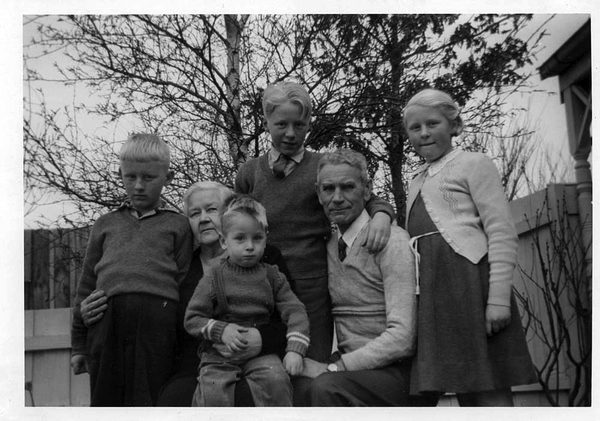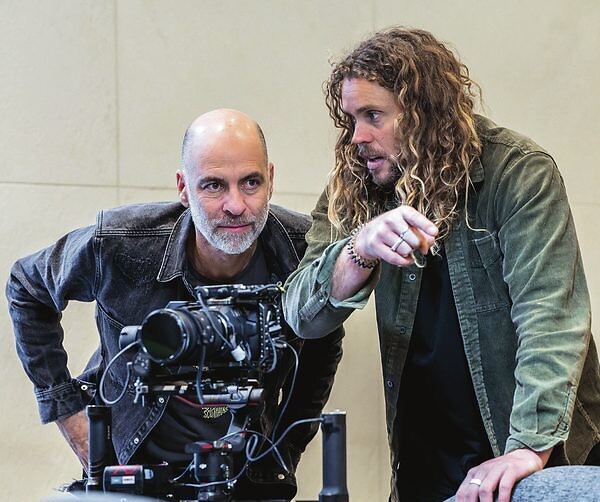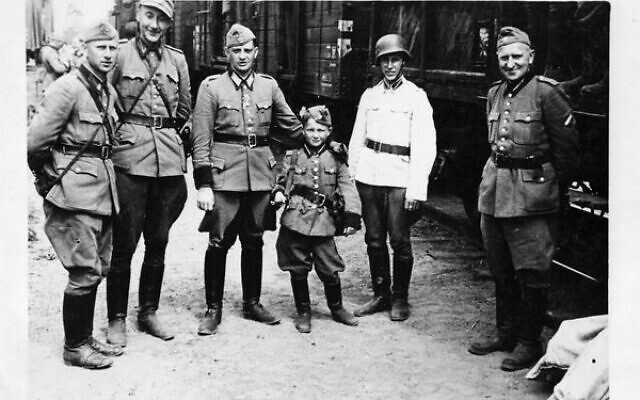Hitler’s Jewish soldier?
The truth can be stranger than ficition, discovers Sharyn Kolieb.
Nazi mascot during WWII who was actually a small Jewish child – was it a hoax or was it a true story?
That is the central question tackled by Jewish Walkley Award-winning director and producer Dan Goldberg in the fascinating documentary Hitler’s Jewish Soldier? which was shown at the Jewish International Film Festival last year and will premiere on SBS on February 8.
It is also an Australian story, as the “mascot” who became known as Alex/Uldis Kurzem arrived in Australia in 1949 after the war, married and raised his three sons here, only revealing his secret 50 years later.
Goldberg – a former editor of The AJN – began working on the story in 2012 as a foreign correspondent with the sense it was a hoax following media reports that claimed to expose the mascot’s story as fraudulent.
Speaking to The AJN, Goldberg said, “I went to Alex Kurzem and put the allegations to him and he defended them … About a decade later I got a phone call from him out of the blue … he said, ‘Dan, I proved them wrong, I told you I would.’”
Kurzem told Goldberg that he had taken a DNA test which proved he was Jewish. Goldberg said following the call he retained “an element of doubt” about his account, but upon digging through the evidence he felt a moral obligation to return to the story.

To get to the bottom of whether or not the story was true, Goldberg interviewed Alex Kurzem, his sons, his adopted family, as well as those who were sceptical of his story, including US academic Dr Barry Resnick, and US forensic genealogist Colleen Fitzpatrick.
Alex Kurzem claimed that during WWII when he was five years old, an execution squad came to his village of Koidanov to kill Jews. In his testimony, Kurzem said, “We tried to run away from the Germans and we got caught. One day my mother said, ‘We’re going to be shot tomorrow. And I said, ‘Well I don’t want to die.’ And she said, ‘Well, we have to die all together.’ I said ‘No,’ so I escaped through the back fence and I ran away in the hills, near the village.”
Kurzem said he escaped to the frozen woods of Belorussia and recalled watching from a tree as his entire village, including his family, were murdered.
He claimed that he survived for several months in the forest by foraging and sleeping in trees to avoid wolves, until a Latvian soldier named Jekabs Kulis found him in the forest.
According to Kurzem, the soldier asked him to take down his pants, which revealed he was circumcised. Kurzem said the soldier said to him, “No good. No good. But I don’t want to kill you and I can’t leave you here because you’ll perish. So what’s I’ll do. I’ll tell the other soldiers that you’re a Russian orphan and I’ll take you with me.”
The battalion made him their child solider, their mascot. They gave him a Latvian name, Uldis Kurzemnieks, a fake birth date, and a small uniform and shorn-off rifle, and he accompanied the battalion as they went from village to village killing Jews. The Latvian battalion were involved in anti-Jewish and anti-partisan operations, and later were incorporated into the SS.
When the Russians were approaching, the Nazis told Kurzem it was not safe for him and placed him with the Latvian family of Jekabs Dzenis, who had volunteered to look after him. That family moved to Australia in 1949 taking Kurzem with them.
When the book The Mascot was released in 2007 authored by Alex’s son Mark Kurzem, the story received international attention and there were a number of people who questioned Alex Kurzem’s claims.
Moreover, a cousin from Kurzem’s adopted family, Maris Lakis, claimed that The Mascot was “wildly embellished and mostly fiction”, offended that the book portrayed the Dzenis family as Nazi supporters.
Some were sceptical about Kurzem’s claim that the Nazis would tell the village they were to be shot and return the next day due to bad weather, which was not typical of how the Nazis operated.
In his documentary, Goldberg interviews Sydney Jewish Museum historian Konrad Kwiet to discuss whether this could have occurred in the village of Koidanov.

Nathan Barlow. Photo: Daniel Hewett
Goldberg follows Kurzem’s journey as he sought to uncover his true identity – his real name and the relatives he longed to meet. The journey is filled with potholes but nevertheless he persisted.
After many years of refusing to take a DNA test which added to suspicion, Kurzem finally took the test in 2019 that confirmed he was 100 per cent Ashkenazi and found living relatives in Canada.
As to how long-lost Jewish relatives felt to learn Kurzem was on the side of the Nazis during the war, a Canadian first cousin said, “He was a child, it was a choiceless choice, he had to survive.”
In 2022, Kurzem passed away from complications from COVID-19 and at his funeral a statement from his son Martin read, “Dad we always believed your story, no matter what anyone else said.”
As to what Goldberg learnt from making this documentary, he said, “I think what I learnt is that truth is often stranger than fiction. And this is one story that proves it.”
Australia Uncovered premieres with Hitler’s Jewish Soldier? tonight (Thursday) on SBS and SBS On Demand from 8.40pm.
The four part collection continues weekly on Thursday from 8.40pm.
Preview Trailer: Australia Uncovered Hitler’s Jewish Soldier


comments